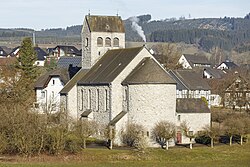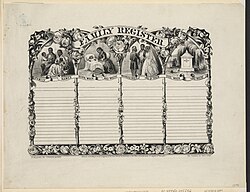
Church records in Germany are historical records that play a crucial role in family research in the country. They provide information on baptisms, marriages, and deaths beyond simple dates. These records often include information about family members, occupations, residences, as well as other relevant details. These records were usually kept by the church or parish, and are an invaluable source for tracing family lines. They are often the only source of information available to trace family histories prior to the introduction of state civil registration in 1874-1876. However, the information in church records is not always error-free and can be incomplete.
Research your ancestors on MyHeritage
History of church records
The history of church records in Germany dates back to the 15th century, or perhaps even earlier. The oldest books preserved today date back to the 16th century. In the past, records were often written in running text, which made them difficult to read. Later, tabular forms were introduced, which greatly improved readability. As early as the 18th century, copies of church records were often made by each parish. There were first copies (originals) and second copies or duplicates (copies). The existence of copies or duplicates of the church records is an important aspect. They were often made for religious reasons to ensure the records were kept even if the originals were lost. In some cases, duplicates were also used for governmental purposes, such as the creation of muster rolls, tax, or census lists.
Prior to civil registration
Before the nationwide introduction of state civil registries, there was no uniform method of documenting births, marriages, and deaths in Germany. This led to considerable difficulties in recording family lines. Church records are therefore the main source for genealogical research in Germany prior to the year 1874.
State records vs. church records
Even after the introduction of state records in 1874, church records retained their importance. Not only do they provide additional information, but when state records are lost or destroyed they again become the only source of information. Church sources may contain details such as godparents, marriage witnesses, and religious ceremonies that cannot be found in government records.
Contents of church records
Baptismal records
- Name of the child
- Date of the baptism
- Names of the parents
- Names of the godparents
- Place of residence of the participants
- Exact day and time of birth for the child
Marriage records
- Names of the bride and groom
- Date of the marriage
- Names of the parents of both bride and groom
- Place of residence for the participants
- Witnesses to the marriage
Death records
- Name of the deceased
- Date of death
- Age of the deceased
- Cause of death
- Sometimes a list of the bereaved family members
Additional records

In addition to basic records, church records may contain other registries such as:
- Confirmations
- Communicants
- Lists of church members
- Family registers
Family registers often give the most information as they list birth and death dates for the parents, as well as all of the children.
Repositories of church records
Church records in Germany are kept in various locations and this differs depending on the denomination of the church. Protestant and Catholic church records are usually kept separately:

- Protestant church records are often located in the parish offices of the respective parish. For the years from 1874-1876 onwards, the respective parish offices are usually the first point of contact.
- Catholic church records are also kept by the parish offices. The jurisdiction may have changed over time, especially for the years before 1874-1876. Therefore, it is important to identify the correct parish.
- Older church records may be found in regional church archives, city archives, or state archives.
- Some Protestant (Lutheran and Reformed) and Catholic church records have been digitized and are available online. Portals such as MyHeritage, Archion.de, and Matricula.eu provide access to digital copies.
Access to church records
Access to church records in Germany can be complicated depending on location and time period. Here are some important considerations:
- Denomination - It is critical to know which denomination the person you are searching belonged to, as Protestant and Catholic church records are kept separately.
- Storage location - The books are often stored in parish offices or church archives. Regional archives and state archives may also have relevant records.
- Protection periods - In some cases, protection periods apply to church records, especially records after 1874-1876. These protection periods may vary by location.
- Former German eastern territories - Finding records from the former German eastern territories can be complicated, as they may be located abroad or in special archives, such as the Protestant Central Archive in Berlin or the Episcopal Central Archive in Regensburg.
Special challenges
Searching for church records can be challenging for many reasons. Handwriting, name spellings, and dates can vary. Catholic church records were long written in Latin, which can make them difficult for researchers to read and understand. Records may also be available in other languages, such as Dutch or French, especially in areas of historical influence.
In addition, special annotations and unusual entries may appear in church records that may require expert interpretation. For example, illegitimate children were sometimes recorded under special designations, and the use of the church calendar can lead to date confusion.
See also
Explore more about Church records in Germany
- Germany, Prussia, Pomerania Church Records, 1544-1945 at MyHeritage
- Germany Family History Records at MyHeritage
- Zigzagging through German Church Records at Legacy Family Tree Webinars
- Leaving a paper trail - Other German sources besides church books and civil registers at Legacy Family Tree Webinars
References



